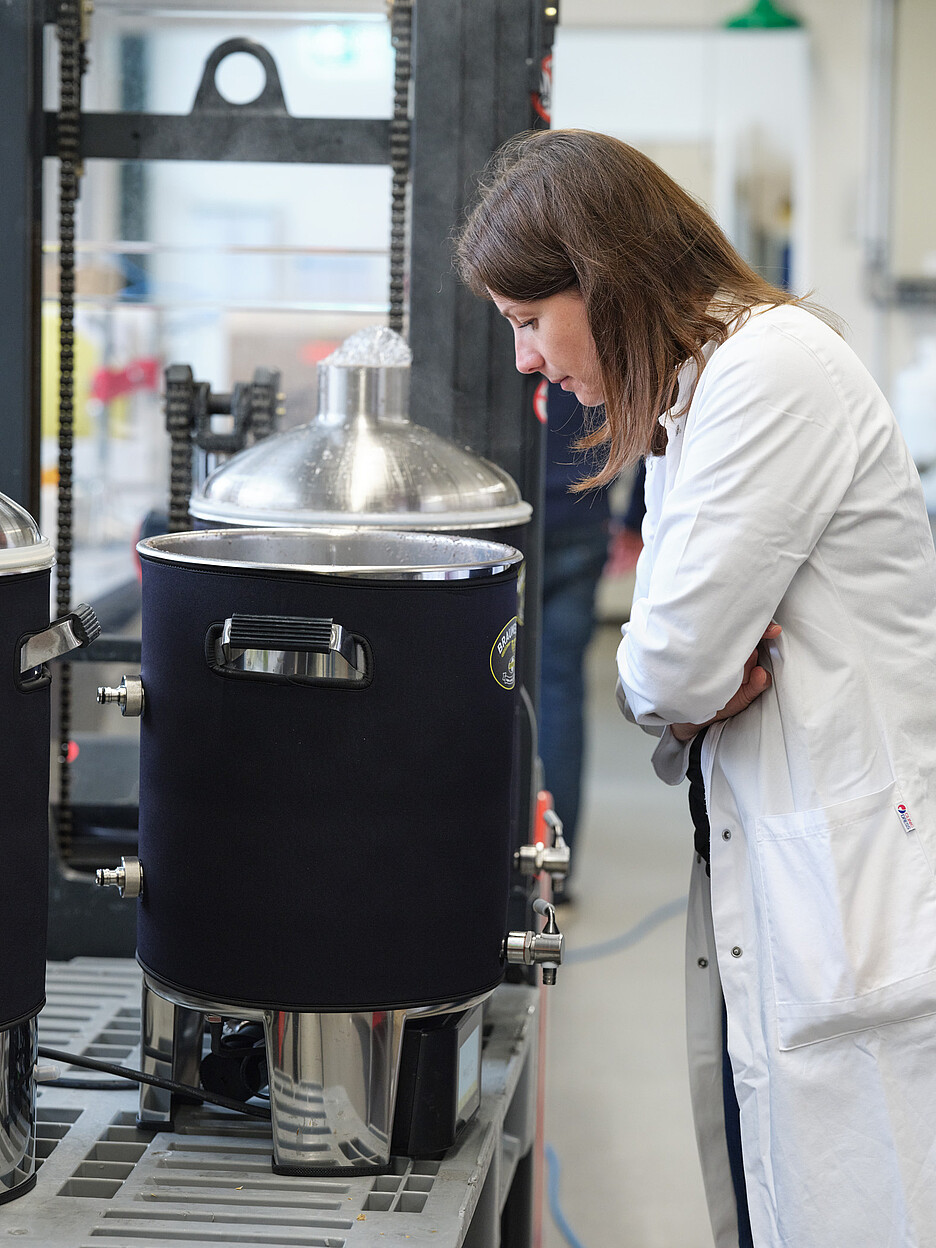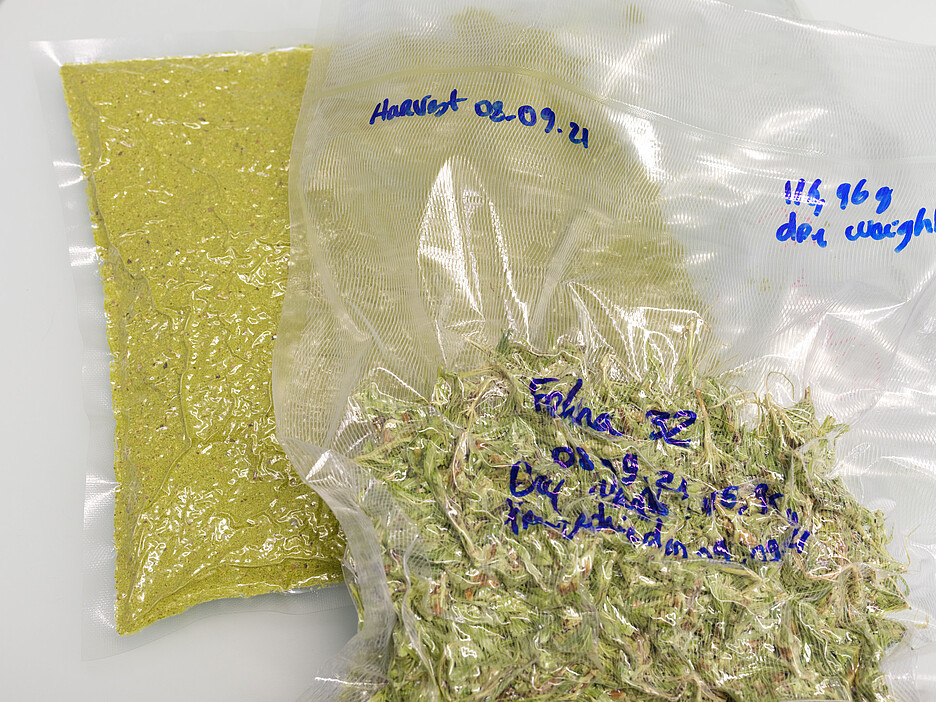
Brewing sustainable beer with hemp instead of hops
Currently, the flowers of hemp grown for industrial use are simply thrown away. Researcher of ZHAW Zurich University of Applied Sciences Amandine André wants to use them to brew beer – and to help Swiss breweries become more independent.
For centuries, beer made in Europe has been brewed from hops, malt, yeast and water. In Germany, the restriction to these four ingredients is even enshrined in law, in what is known as the Reinheitsgebot, the purity law. Anyone who wants to deviate from this winning formula would need good reason to do so. And a lot of audacity.
Amandine André has both. Originally from France, André is a research assistant in the Food Chemistry research group at ZHAW’s Institute of Food and Beverage Innovation. Her idea is to replace some or all of the hops in beer with hemp. More specifically, with dried hemp flowers. She’s been experimenting, trying to find the right recipe, since 2019.
Three good reasons for hemp

Amandine André gives three reasons for her enterprising approach. First off, hops don’t grow particularly well in Switzerland: just ten percent of the country’s demand is met by domestic production. “The breweries are dependent on imports and have little leeway to protect themselves against fluctuations in production and quality”, says the researcher. Hemp, on the other hand, grows very well in Switzerland. “Almost like weeds. You put a seed in the ground, and off it goes. The plant hardly needs any fertilisers, pesticides or irrigation.” So home-grown hemp could help local brewers overcome their dependence on imports. For that reason, the Swiss Brewery Association is also very interested in the Wädenswil hemp experiments.
Hops suffering from climate change
Secondly, hops are increasingly having trouble with climate change. Even in traditional hop-growing regions, cultivation has always been challenging, and as the temperature rises it’s becoming even more difficult. The quality suffers, and the content of amaroids, the bitter compounds that give beer its flavour, decreases. Hemp, on the other hand, has no problem with heat. “It even grows in Morocco”, says Amandine André. “Climate change is unlikely to cause it any problems”. In general, hemp is very robust, as the researchers have seen during their planting experiments in the garden of ZHAW’s Grüental campus. In 2019 it was warm and dry, but in 2021, rain and storms predominated. When hail destroyed the plants, they spontaneously rebudded. The harvest was delayed, but the quality was no worse than in 2019.

Thirdly, hemp flowers are an unused resource. We are of course talking about what is known as industrial hemp, which contains virtually no psychoactive substances. Its cultivation has been permitted in Switzerland for a number of years now, after previously being banned. While the stalks are used as building material or for paper production and the seeds are pressed for oil, the flowers of industrial hemp are considered a waste product.
“How can we turn a primary product to good use instead of throwing it away?”
In search of the right hemp varieties
The 2019 plant experiments aimed to work out which hemp varieties produce a particularly high content of amaroids and hop-like aromas. The trials yielded two favourites. Since then, André and her team have been searching for the right recipe for hemp beer – and simultaneously trying to track down and isolate the molecules that produce the bitter taste. Both tasks are pioneering work. The project is financed with a sum of 97,000 francs through the SPARK funding programme. With this new funding vehicle, the Swiss National Science Foundation explicitly aims to support promising projects that pursue unorthodox ideas. So it’s a perfect fit.
Amaroids are not all the same
The analysis of the hemp amaroids is still in progress. Amandine André is using the combined power of modern chemistry, such as mass spectrometry and high-performance liquid chromatography. Perhaps the most surprising result so far is that the amaroids in hemp are not the same as those in hops. “It’s likely that two classes of molecules, alkaloids and flavonoids, produce the bitterness of hemp”, says the researcher. Caffeine is an example of an alkaloid. Flavonoids, meanwhile, are substances that plants use for functions such as protection from solar radiation. They are considered healthy for humans.
Searching for the right recipe
“What we’re aiming to do, instead, is come up with a product that tastes exactly the same as a traditional hop beer.”
Drinks labelled ‘Hemp Beer’ can already be found in shops today. But in those drinks the hemp isn’t used as a substitute; rather, it’s in addition to the hops. Most of these beers have a characteristic hemp taste. “That’s exactly what we don’t want with our project”, says Amandine André. “What we’re aiming to do, instead, is come up with a product that tastes exactly the same as a traditional hop beer.” The team is keenly aware of the often conservative tastes of many beer drinkers.
Three beers brewed
André and her team will soon be finding out whether the project has been successful. With the assistance of the Food Process Development research group, the team produced three different beers on a brewing day in November: a traditional Pils, a pure hemp beer and a beer in which three quarters of the hops were replaced with hemp. After several weeks of fermentation and storage, the beers will be taste-tested blind in mid-December with the assistance of the Food Sensory Science research group. The experiment will have succeeded if the test subjects consider that the two new variants are almost indistinguishable from the classic Pils.
Tasting session in December
If that is the case, Amandine André aims to follow up on her project. Complete the analysis, refine the recipe. And if possible, find a brewery she can work with to develop the hemp beer to a market-ready stage. “I very much hope that we can carry on”, she says. Hemp, this nutrient-packed, wholesome and sustainable plant, is her area of interest. Used by mankind for millennia, hemp fell into disrepute a few decades ago because of the focus on drugs. “It’s gradually losing its negative image, and in recent years people have rediscovered its versatility”, says André. “But hemp is still somewhat underappreciated”.
-
N
Dear Elisa, the english version of the media release is now also available here: https://www.zhaw.ch/en/medien/medienmitteilungen/detail-news-releases/event-news/mit-hanf-statt-hopfen-nachhaltiges-bier-brauen/-
E
Thank you so very much!!
-
-
E
Very interested in the results of your taste panels!!
-
P
Thank you for your interest. After weeks of storage, a blind tasting was finally carried out. The two varieties of the ZHAW hemp beers were compared with a commercial hemp beer containing a pronounced hemp aroma, and with a classical lager beer. Hemp and hop aromas, citrus and fruit flavours, sweetness, bitterness and general preference were evaluated. The results are promising: the seven test subjects could not detect any difference between the experimental beer brewed with hemp and the classic lager - both tasted equally good, equally bitter and not like hemp. The beers brewed at the ZHAW will be re-evaluated after several months of further storage. In case you are interested in more details: In the near future, the exact research result will also be published in a peer reviewed journal. Best regards Patricia Faller, Editor in Chief ZHAW Impact
-
N
Dear Elisa, the english version of the media release is now also available here: https://www.zhaw.ch/en/medien/medienmitteilungen/detail-news-releases/event-news/mit-hanf-statt-hopfen-nachhaltiges-bier-brauen/
-
2 Comments